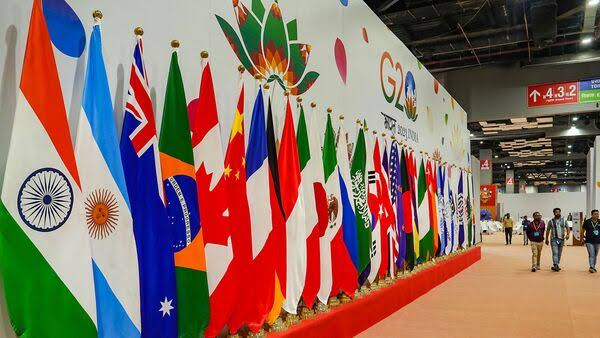G20 Summit 2023

G20 Summit 2023 in India: “One Earth, One Family, One Future” – To Whom?
G20 Summit is an annual gathering of leaders from the world’s largest economies convened ostensibly to discuss global economic and financial issues. However, as the 2023 G20 Summit unfolds in New Delhi, India, under the theme “One Earth, One Family, One Future,” it raises critical questions about its true purpose and impact.
The theme “One Earth” issues an idealistic call for environmental responsibility, which sharply contrasts with the actions of the capitalist forces dominating the G20. These powerful entities have consistently pursued profit at the expense of the environment, exploiting natural resources without restraint and significantly contributing to environmental degradation, climate change, and loss of biodiversity.
“One Family” sounds inclusive and harmonious, yet it prompts questions about which family the G20 truly represents. While the leaders of big economies may consider themselves part of a global family, they often act as political managers in the hands of powerful transnational corporations. This global elite shares common interests and objectives that prioritize profit over the well-being of the majority of the world’s population. The rhetoric of “One Family” becomes hollow when it fails to address the growing wealth gap and systemic inequalities perpetuated by these economic powerhouses.
The summit’s promise of “One Future” appears superficial when examined in the context of neoliberal politics. Capital has become a major force behind global political alliances, and the G20 serves as a platform to maintain global hegemony. This gathering primarily serves the interests of multinational corporations and elite groups, making it difficult to translate its colorful slogans into meaningful change for the 99% of the world’s population who are often marginalized and left behind. Corporate lobby groups, with the Business20 (B20) at their core, wield immense influence within the G20, shaping policy recommendations presented to governments and further entrenching the dominance of corporate interests in global decision-making. It is imperative to counterbalance this corporate influence and prioritize the needs and concerns of the majority.
G20 Summit has coined the optimistic slogan “One Earth, One Family, One Future.” However, this slogan must be backed by concrete actions that address the environmental crisis, economic inequalities, and corporate influence within the G20. Mere rhetoric will not suffice to bring about meaningful change. The Summit slogan is not new; it is embedded in the history of G20 pledges and themes reflecting the interests and actions of the global corporate hegemonic class and their impact on the world’s most vulnerable populations. Since its inception in 1999, the G20 is propagating to address global economic challenges, responding to financial crises, and shaping economic policies.
The 2008 Washington Declaration: Restoring Confidence and Growth pledged to restore global growth and reform financial systems. At this point, the priority was stabilizing the financial sector and preventing a total economic collapse.
The 2009 London Summit: A Comprehensive Approach expanded the scope of pledges to include job creation, financial regulation, and trade promotion, signaling a move toward a more holistic approach to economic recovery.
The 2010 Seoul Summit: Macroeconomic Policies and Structural Reforms emphasized macroeconomic policies, fiscal consolidation, and structural reforms, with a focus on exchange rate stability, reflecting the growing importance of emerging economies.
The 2011 Cannes Communiqué: Addressing Tensions and Imbalances acknowledged persistent global imbalances and tensions in financial markets, emphasizing the need to boost growth, create jobs, and strengthen financial stability.
The 2012 Riyadh Consultation Meeting: Sustainable Economic Growth introduced the theme of sustainable economic growth, emphasizing the need to create conditions for economic growth that would benefit all.
The 2013 St. Petersburg Summit: Exiting the Crisis recognized the need for coordinated action and economic resilience.
The 2014 Brisbane Communiqué: Raising Global Growth highlighted the need to raise global growth, create jobs, and strengthen global institutions, also addressing issues like gender equality and infrastructure development.
The 2015 Antalya Communiqué: Inclusive Growth emphasized inclusive growth, recognizing that economic prosperity should benefit everyone, and focused on engaging with low-income developing countries.
The 2016 Hangzhou Declaration: Tackling Global Challenges highlighted the need to address global challenges, including geopolitical tensions, terrorism, and slow productivity growth.
The 2017 Hamburg Declaration: People, Planet, Prosperity introduced a tripartite theme focusing on people, planet, and prosperity, emphasizing the interconnectedness of these elements in achieving global economic goals.
The 2018 Buenos Aires Declaration: Future of Work and Gender Equality focused on the future of work, infrastructure development, sustainable food, and gender equality.
The 2019 Osaka Declaration: Harnessing Technological Innovation emphasized harnessing technological innovation, particularly digitalization, for economic growth and benefiting all.
The 2020 Riyadh Virtual Summit: Realizing Opportunities of the 21st Century emphasized seizing opportunities in the 21st century through innovation and global cooperation.
The 2021 Rome Declaration: Recovering from COVID-19 focused on recovering from the pandemic, sustainable growth, and global solidarity.
The 2022 Bali Declaration: Strengthening Cooperation marked 14 years of G20 cooperation, with a focus on inclusive growth and economic stability.
Now, the 2023 G20 Summit in India: “Vasudhaiva Kutumbakam” – The World is One Family, centers around the theme of interconnectedness and the well-being of all life forms on Earth, emphasizing the broader implications of economic policies.
The G20’s history of pledges and themes reflects the evolving economic priorities of the world’s major economies. While these pledges often emphasize growth, stability, and cooperation, they are also influenced by the interests of the global corporate elite. However, there are strong dissenting voices against the G20 particularly protests from the 2009 G20 London summit to the 2017 G20 Hamburg summit.
Dissenting voices and anti-globalist movements against the G20 have emerged as a response to perceived shortcomings in the summit’s agenda, governance, and responsiveness to global challenges. While the G20 serves as a platform for global economic cooperation, it has been criticized for its lack of transparency and accountability, as well as its perceived focus on corporate interests. Dissenting voices serve as a reminder that global governance institutions must be inclusive, responsive, and accountable to address the complex challenges facing the world today. Ignoring or suppressing these voices can undermine the legitimacy of such institutions and hinder progress toward a more just and equitable global order.
The 2023 G20 Summit in India presents an opportunity to reflect on the paradoxes within its themes and objectives. While the summit professes to champion environmental responsibility, inclusivity, and a common future, the reality is often far from these ideals.
The influence of powerful corporations, the exploitation of the Earth, and the perpetuation of global inequalities must be addressed if the G20 is to truly fulfill its promise of a better future for all. The G20’s legitimacy is under scrutiny, and it is essential for leaders to prioritize the interests of the global population over those of powerful elites. Otherwise, the colorful slogans will remain empty words, and the G20 will continue to fall short of its potential as a force for positive change in the world. As we move forward, it is crucial to assess the impact of G20 decisions on vulnerable populations and ensure that economic policies are inclusive, sustainable, and truly benefit all, aligning with the theme of the 2023 G20 Summit: “The World is One Family.”


